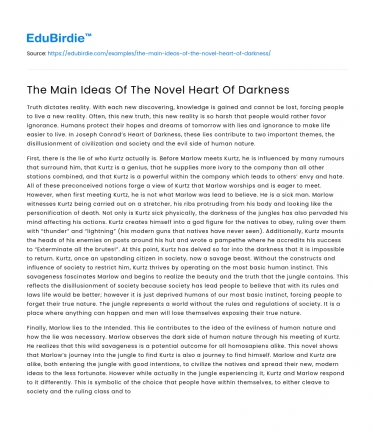Truth dictates reality. With each new discovering, knowledge is gained and cannot be lost, forcing people to live a new reality. Often, this new truth, this new reality is so harsh that people would rather favor ignorance. Humans protect their hopes and dreams of tomorrow with lies and ignorance to make life easier to live. In Joseph Conrad’s Heart of Darkness, these lies contribute to two important themes, the disillusionment of civilization and society and the evil side of human nature.
First, there is the lie of who Kurtz actually is. Before Marlow meets Kurtz, he is influenced by many rumours that surround him, that Kurtz is a genius, that he supplies more ivory to the company than all other stations combined, and that Kurtz is a powerful within the company which leads to others’ envy and hate. All of these preconceived notions forge a view of Kurtz that Marlow worships and is eager to meet. However, when first meeting Kurtz, he is not what Marlow was lead to believe. He is a sick man. Marlow witnesses Kurtz being carried out on a stretcher, his ribs protruding from his body and looking like the personification of death. Not only is Kurtz sick physically, the darkness of the jungles has also pervaded his mind affecting his actions. Kurtz creates himself into a god figure for the natives to obey, ruling over them with “thunder” and “lightning” (his modern guns that natives have never seen). Additionally, Kurtz mounts the heads of his enemies on posts around his hut and wrote a pampethe where he accredits his success to “Exterminate all the brutes!”. At this point, Kurtz has delved so far into the darkness that it is impossible to return. Kurtz, once an upstanding citizen in society, now a savage beast. Without the constructs and influence of society to restrict him, Kurtz thrives by operating on the most basic human instinct. This savageness fascinates Marlow and begins to realize the beauty and the truth that the jungle contains. This reflects the disillusionment of society because society has lead people to believe that with its rules and laws life would be better; however it is just deprived humans of our most basic instinct, forcing people to forget their true nature. The jungle represents a world without the rules and regulations of society. It is a place where anything can happen and men will lose themselves exposing their true nature.
Finally, Marlow lies to the Intended. This lie contributes to the idea of the evilness of human nature and how the lie was necessary. Marlow observes the dark side of human nature through his meeting of Kurtz. He realizes that this wild savageness is a potential outcome for all homosapiens alike. This novel shows that Marlow’s journey into the jungle to find Kurtz is also a journey to find himself. Marlow and Kurtz are alike, both entering the jungle with good intentions, to civilize the natives and spread their new, modern ideas to the less fortunate. However while actually in the jungle experiencing it, Kurtz and Marlow respond to it differently. This is symbolic of the choice that people have within themselves, to either cleave to society and the ruling class and to be civilized, or to allow the savagery within run wild. This conflict shows the readers that Kurtz used to be Marlow and now represents what he could possibly become. Joseph Conrad is showing to his readers that each person has both Marlow, sanity and order, and Kurtz, barbaric and savagery, inside themselves. This is what causes Marlow to lie to the Intended. The Intended is depicted as a frail and delicate woman, living in her own world. If Marlow did not lie to her, the truth of what Kurtz was and this potential insanity would shatter her world. This is representative of civilization and the society that people have created. Society and civilization is fragile just like the Intended and the truth of the barbarism of humans would destroy all the ideas and rules that they impose, allowing anarchy to run rampant.
In in Joseph Conrad’s Heart of Darkness, there are two major lies, the one of Kurtz’s true personality and who he is and the one where Marlow lies to the Intended about what became of Kurtz in the end. These lies add to some of the vital overarching themes of the novel, disillusionment of civilization and society and the the evil that lies within the human psyche causing people to operate on savage instinct. These lies are reflective of the lies within the society and civilization that people have created today and the cruel truths that are closer than people think.
Works Cited
- Conrad, Joseph. Heart of Darkness. New York, Signet Classic, 1997






 Stuck on your essay?
Stuck on your essay?

